December 3, 2012 - When a child is diagnosed with cerebral palsy, parents may go through a range of emotions that begin at despair, grief and fear for the child’s future.
Not in this town in Ukraine.
In Bila Tserkva, a city of about 200,000 that is 50 miles from the capital city of Kyiv, a diagnosis of cerebral palsy is met with hope, as parents turn to Chance.
A children’s health center set up 17 years ago, Chance is the result of the combined work of the Bila Tserkva City Council and Ayurveda, a society for disabled children and their parents. The center is a clinic, kindergarten, school and a vocational training center. Using modern methods of physical rehabilitation and education, staff at the center help children adapt to the challenges of adult life. The center was supported in 2007-2008 with $150,000 from the Ukrainian Social Investment Fund, a government institution established with support from the World Bank.
The funds were used to replace windows, provide insulation and refurbish the center. Other improvements include a computer classroom where teens are educated and helped to transition to a work environment. The building, which once resembled a Soviet kindergarten, is now a modern rehabilitation center for children and youth.
Every year, about 500 children undergo rehabilitation here, giving them a shot at acquiring work skills and finding a job.
Take 24-year-old Olena Stuzhna, for example. An alumnus of Chance, she is studying for a degree in Social Work and works at the center, teaching children to work with computers, and helping issue documents for travel abroad and cultural exchanges. Still, barriers remain for people like Olena to capitalize on opportunities for personal development.

